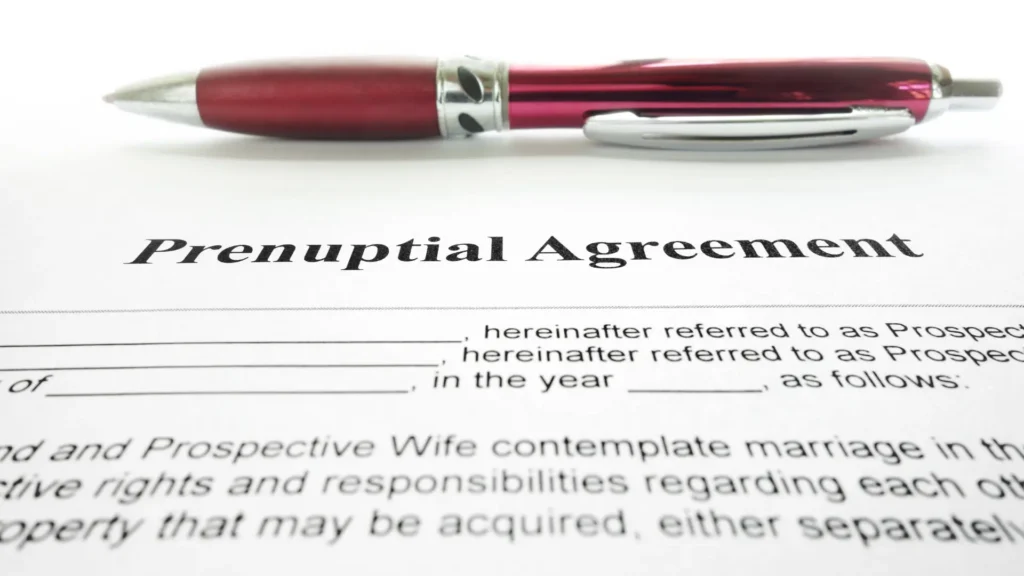Prenuptial agreements, also known as pre-marital agreements, are a common choice for couples seeking to protect their interests in the event of divorce, separation, or the death of a spouse. Even if the need for a prenuptial agreement never arises, it serves as a powerful tool for maintaining peace of mind throughout the marriage. The more secure a couple feels during their marriage, the stronger their relationship will be.
What is a Prenuptial Agreement?
A prenuptial agreement, often called a prenup for short, is a contract between you and your future spouse. It outlines what will happen with your money, property, and other assets if you divorce, separate, or if you or your spouse dies. Think of it as insurance that can protect each spouse by ensuring fairness and clarity if things don't work out.
How Prenuptial Agreements Work
Prenuptial agreements are executed before the marriage, establishing each spouse's financial rights and responsibilities in the event of a divorce or death. Common provisions include those related to:
- Asset protection
- Division of property
- Spousal support
- Clarification of inheritance rights
- Estate planning
At Vacca Family Law Group, we encourage you to view your prenuptial agreement as an opportunity to have an open, collaborative conversation with your soon-to-be spouse. We like to call this “Conscious Coupling.” This proactive approach not only strengthens the marital bond but also fosters trust and equips you with essential conflict-resolution skills.
We strongly advise both parties to seek legal counsel during prenuptial agreement negotiations. This ensures a complete understanding of the agreement's terms and safeguards the interests of both parties.
Misconceptions About Prenuptial Agreements
Contrary to popular belief, discussing a prenuptial agreement does not imply a lack of trust or commitment. Instead, it demonstrates a commitment to financial transparency and mutual respect. Our experienced attorneys can assist by facilitating constructive conversations and providing support and resources to navigate this process effectively.
FAQs About Prenuptial Agreements
We understand that prenuptial agreements raise many questions. Here are some of the most common ones we are asked:
- Do I Need a Prenuptial Agreement? If you or your spouse have concerns about protecting premarital assets or you plan to divide income and assets any differently from what New York law would assume, then you likely need a prenup. Even if divorce seems unlikely, it’s wise to plan for unforeseen circumstances. Negotiating terms for a prenuptial agreement also provides an excellent opportunity for you and your future spouse to have a guided discussion about finances, which is not often a topic that is discussed while dating.
- How Long Does It Take to Draft a Prenuptial Agreement? It could take 3 or 4 months to thoroughly discuss and negotiate the terms of a prenup. We advise starting the process approximately six months before the wedding to allow sufficient time for drafting and negotiations. You don’t want to still be negotiating terms just weeks—or days—before your wedding.
- Does a Prenup Protect Income and Assets Acquired During the Marriage? Yes, a prenup can protect future income and assets as well as the increase in value of those assets. For couples who plan to keep their finances separate during the marriage and only share assets that are put into joint name for example, a prenuptial agreement will be necessary to make sure that intention is enforced should the marriage end.
- What If We Need a Simple Prenup? Having a truly “simple prenup” likely means that you are planning to divide income and assets the same way the law already dictates for divorcing couples. However, if you and your future spouse want to define marital properly any differently than what the law provides or you plan to waive any of your legal rights, your prenup will be a more complex document to properly suit your needs.
- What if We Run Out of Time and Our Prenuptial Agreement Isn’t Signed Before the Wedding? Prenuptial agreements need to be signed before the marriage. However, there is an opportunity to sign what’s called a Postnuptial Agreement after the wedding. Like a prenup, a Postnuptial Agreement is a document that clarifies your financial rights and obligations, outlines how assets and debts will be divided in a divorce, and helps you avoid a contentious divorce.
Contact Vacca Family Law Group
Vacca Family Law Group has crafted hundreds of meticulously detailed prenuptial agreements for couples in New York City with all different backgrounds and financial situations. Our attorneys can help you understand how the terms of your prenup can address your specific needs and provide confidence and peace of mind as you and your spouse enter your marriage. For more information or to begin the process of creating your prenuptial agreement, contact us online or call us at (646) 502-8591 to schedule your free introductory call.
Additional Resources
Prenuptial Agreements Part 1: What’s Mine is Yours? What’s Yours Is Mine? Wait, What’s Going On?
It’s wedding season, and in addition to checking the typical wedding-related tasks off the to-do list, many soon-to-be newlyweds are reaching out to lawyers like me to draft prenuptial agreements. And one of the most common things they tell me is:…
Read MorePrenuptial Agreements Part 2: 4 More Things Not to Worry About if You Have a Prenup
This is a continuation of my previous post that explored what a “simple” prenuptial agreement looks like and when a more complex agreement may be needed. In this post we move beyond the basics of separate property and marital property to explore…
Read MoreHow Millennials are Making Prenups the Norm: Prenuptial Agreement Checklist
Over the past few years, my law and mediation practice has seen a significant increase in requests for prenuptial agreements. A recent New York Times article The Rise of the Millennial Prenup cites the following contributing factors for the increase: millennials are…
Read More


